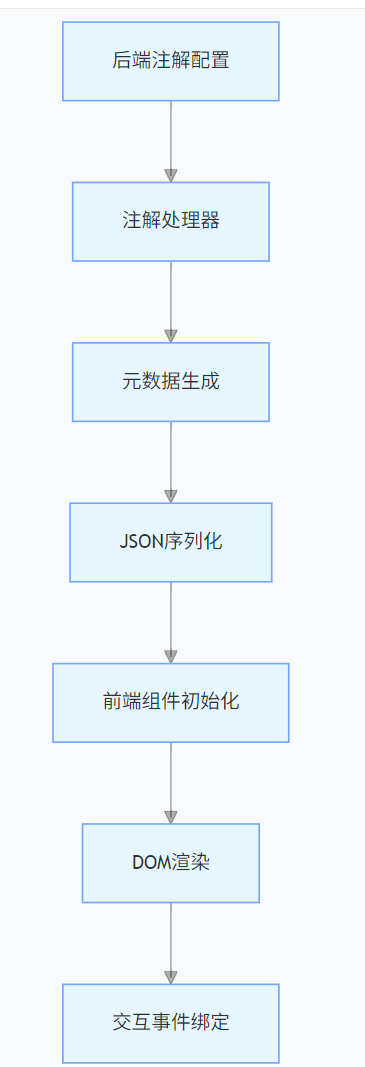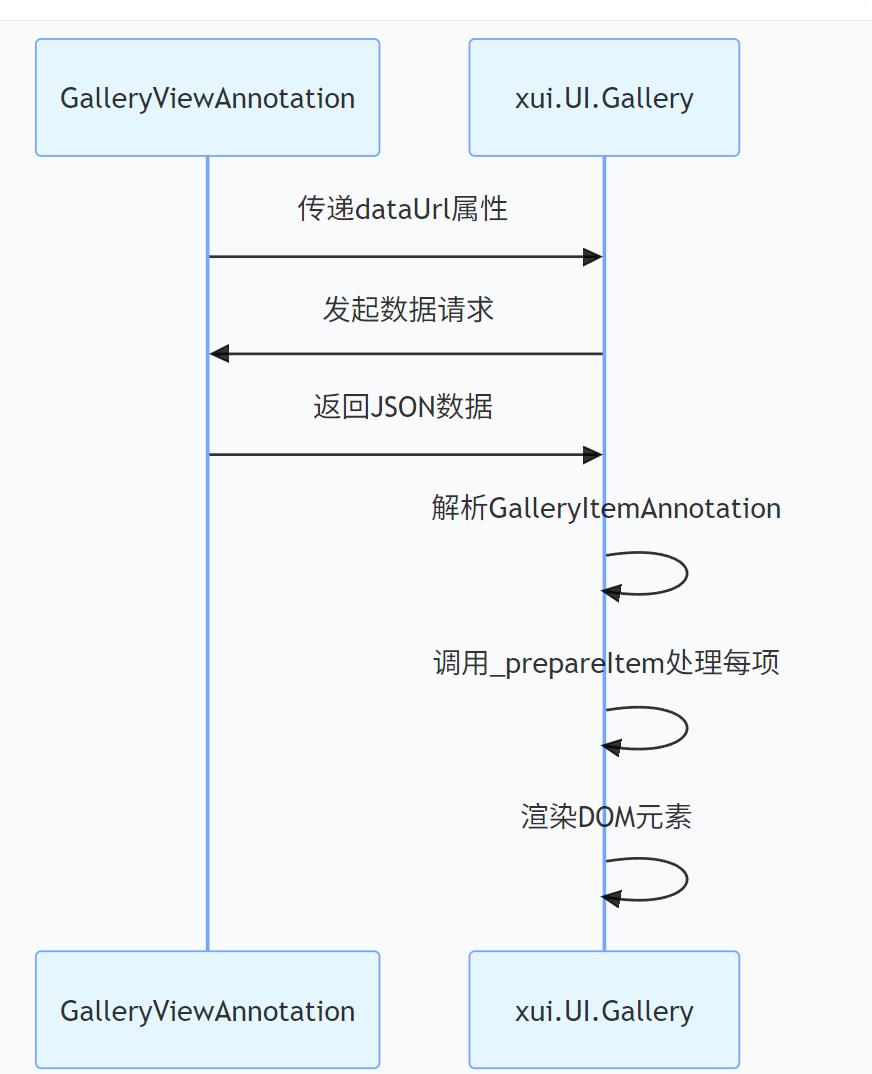OneCode3.0 Gallery 组件前后端映射机制:从注解配置到前端渲染的完整链路
一、注解体系与前端组件的映射基础
OneCode Gallery 组件实现了 Java 注解与前端 UI 组件的深度绑定,通过GalleryAnnotation、GalleryItemAnnotation和GalleryViewAnnotation三个核心注解,构建了从后端配置到前端渲染的完整链路。这种映射机制的核心价值在于:将 Java 开发者熟悉的注解配置直接转换为高性能的前端画廊组件,无需编写 JavaScript 代码即可实现复杂的多媒体展示功能。
1.1 技术架构总览

- 注解层:开发者通过 Java 注解声明画廊配置
- 处理层:OneCode 框架解析注解生成元数据
- 传输层:元数据序列化为 JSON 格式传递到前端
- 渲染层:xui.UI.Gallery 组件解析配置并渲染 DOM
- 交互层:绑定事件处理器实现用户交互
二、GalleryAnnotation 与前端组件的映射关系
2.1 注解源码与核心属性映射
package com.ds.esd.annotation;import com.ds.esd.annotation.event.CustomGalleryEvent;import com.ds.esd.annotation.menu.GridMenu;import com.ds.esd.annotation.ui.BorderType;import com.ds.esd.annotation.ui.ComponentType;import com.ds.esd.annotation.ui.Dock;import com.ds.esd.annotation.ui.SelModeType;import com.ds.web.annotation.NotNull;import java.lang.annotation.*;@Inherited@Retention(RetentionPolicy.RUNTIME)@Target({ElementType.TYPE})public @interface GalleryAnnotation { String bgimg() default \"\"; String imageClass() default \"\"; @NotNull String iconFontSize() default \"4.0em\"; @NotNull BorderType borderType() default BorderType.none; @NotNull Dock dock() default Dock.fill; boolean resizer() default true; boolean autoImgSize() default false; boolean autoItemSize() default true; boolean iconOnly() default false; String itemPadding() default \"\"; String itemMargin() default \"\"; @NotNull String itemWidth() default \"8.0em\"; @NotNull String itemHeight() default \"8.0em\"; @NotNull String imgWidth() default \"260\"; @NotNull String imgHeight() default \"180\"; int columns() default 0; int rows() default 0; String flagText()default\"\"; String flagClass()default\"\"; String flagStyle()default\"\"; @NotNull SelModeType selMode() default SelModeType.single; Class[] customService() default {}; ComponentType[] bindTypes() default {ComponentType.GALLERY}; GridMenu[] customMenu() default {}; GridMenu[] bottombarMenu() default {}; @NotNull Class<? extends Enum> enumClass() default Enum.class; CustomGalleryEvent[] event() default {}; boolean autoIconColor() default true; boolean autoItemColor() default false; boolean autoFontColor() default false; String[] iconColors() default {}; String[] itemColors() default {}; String[] fontColors() default {};}2.2 关键属性映射详解
代码示例:columns 属性的映射实现
// 前端组件中处理columns属性if (cols) { item._itemSize += \'width:\' + (100 / cols + \'%\') + \';\';}三、GalleryItemAnnotation 与项渲染的映射
3.1 注解源码与项渲染映射
package com.ds.esd.annotation;import com.ds.enums.BeanClass;import com.ds.esd.annotation.event.CustomGalleryEvent;import com.ds.esd.annotation.ui.*;import com.ds.esd.annotation.menu.CustomGalleryMenu;import java.lang.annotation.*;@Inherited@Retention(RetentionPolicy.RUNTIME)@Target({ElementType.CONSTRUCTOR, ElementType.TYPE, ElementType.METHOD})public @interface GalleryItemAnnotation { String comment() default \"\"; String renderer() default \"\"; String imagePos() default \"\"; String imageBgSize() default \"\"; String imageRepeat() default \"\"; String imageClass() default \"\"; String iconFontSize() default \"\"; String iconStyle() default \"\"; String flagText() default \"\"; String flagClass() default \"\"; String flagStyle() default \"\"; String image() default \"\"; String valueSeparator() default \"\"; String euClassName() default \"\"; BorderType borderType() default BorderType.none; boolean activeLast() default true; CustomGalleryEvent[] event() default {}; CustomGalleryMenu[] contextMenu() default {}; SelModeType selMode() default SelModeType.single; IconColorEnum iconColor() default IconColorEnum.NONE; ItemColorEnum itemColor() default ItemColorEnum.NONE; FontColorEnum fontColor() default FontColorEnum.NONE; ComponentType[] bindTypes() default {ComponentType.GALLERY, ComponentType.BUTTONLAYOUT, ComponentType.TITLEBLOCK};}nnotation.ui.*;import com.ds.esd.annotation.menu.CustomGalleryMenu;import java.lang.annotation.*;@Inherited@Retention(RetentionPolicy.RUNTIME)@Target({ElementType.CONSTRUCTOR, ElementType.TYPE, ElementType.METHOD})public @interface GalleryItemAnnotation { String comment() default \"\"; String renderer() default \"\"; String imagePos() default \"\"; String imageBgSize() default \"\"; String imageRepeat() default \"\"; String imageClass() default \"\"; String iconFontSize() default \"\"; String iconStyle() default \"\"; String flagText() default \"\"; String flagClass() default \"\"; String flagStyle() default \"\"; String image() default \"\"; String valueSeparator() default \"\"; String euClassName() default \"\"; BorderType borderType() default BorderType.none; boolean activeLast() default true; CustomGalleryEvent[] event() default {}; CustomGalleryMenu[] contextMenu() default {}; SelModeType selMode() default SelModeType.single; IconColorEnum iconColor() default IconColorEnum.NONE; ItemColorEnum itemColor() default ItemColorEnum.NONE; FontColorEnum fontColor() default FontColorEnum.NONE; ComponentType[] bindTypes() default {ComponentType.GALLERY, ComponentType.BUTTONLAYOUT, ComponentType.TITLEBLOCK};}3.2 项渲染的模板映射机制
前端通过模板引擎实现注解属性到 DOM 的映射,核心模板定义如下:
<!-- 前端模板片段 --><div class=\"xui-uitembg {itemClass}\" style=\"padding:{itemPadding};margin:{itemMargin}\"> <div style=\"{_bgimg}\"> <img src=\"{image}\" style=\"{imgWidth};{imgHeight}\"> <div class=\"caption\">{caption}</div> <div class=\"comment\">{comment}</div> <div class=\"flag {flagClass}\" style=\"{flagStyle}\">{flagText}</div> </div></div>关键映射点:
- image属性直接绑定到标签的src
- flagText和flagClass控制标志元素的显示
- comment和caption映射到对应的文本节点
- iconColor通过_iconColor变量转换为 CSS 颜色
四、GalleryViewAnnotation 与数据绑定
4.1 注解源码与数据渲染
ppackage com.ds.esd.annotation.view;import com.ds.enums.BeanClass;import com.ds.esd.annotation.CustomClass;import com.ds.esd.annotation.ui.CustomViewType;import com.ds.esd.annotation.ui.ModuleViewType;package com.ds.esd.annotation.view;import com.ds.enums.BeanClass;import com.ds.esd.annotation.CustomClass;import com.ds.esd.annotation.ui.CustomViewType;import com.ds.esd.annotation.ui.ModuleViewType;import java.lang.annotation.*;@Inherited@CustomClass(viewType = CustomViewType.LISTMODULE, moduleType = ModuleViewType.GALLERYCONFIG)@Retention(RetentionPolicy.RUNTIME)@Target({ElementType.METHOD, ElementType.FIELD})public @interface GalleryViewAnnotation { String expression() default \"\"; String saveUrl() default \"\"; String searchUrl() default \"\"; String sortPath() default \"\"; String addPath() default \"\"; String editorPath() default \"\"; String delPath() default \"\"; String dataUrl() default \"\"; String clickFlagPath() default \"\"; boolean cache() default true; boolean autoSave() default false; String itemCaption() default \"\"; String itemId() default \"\";}```**核心实现代码**:```javascript// 前端数据加载逻辑if (this.properties.dataUrl) { xui.ajax.get(this.properties.dataUrl, function(data) { this.setItems(data.items); this.refresh(); }.bind(this));}五、事件处理机制的双向映射
5.1 注解事件与前端处理器的绑定
GalleryAnnotation和GalleryItemAnnotation的event属性通过以下流程映射到前端事件:
- 后端事件定义:
@GalleryAnnotation( event = { @CustomGalleryEvent(name = \"onClick\", handler = \"handleClick\") })public class ProductGallery { ... }- 前端事件绑定:
// xui.UI.Gallery中的事件映射Behaviors: { ITEM: { onClick: function(profile, e, src) { var item = profile.getItemByDom(src); profile.callEvent(\'onClick\', [item, e]); } }}- 事件处理器调用:
后端定义的handler方法通过@APIEventAnnotation映射到前端的事件处理器,实现前后端事件的协同处理。
5.2 特殊事件处理:图片加载与错误处理
// 图片加载完成事件onLoad: function(profile, e, src) { var img = xui.use(src).get(0), path = img.src; if (path != xui.ini.img_bg) { // 应用autoImgSize配置 if (item.autoImgSize || p.autoImgSize) { nn.attr(\'width\', \'\'); nn.attr(\'height\', \'\'); } // 标记加载状态 item._status = \'loaded\'; node.style.visibility = \"visible\"; }},// 图片加载失败处理onError: function(profile, e, src) { var icon = profile.getSubNodeByItemId(\'ICON\', item.id); icon.removeClass(\'xui-icon-loading\').addClass(\'xui-load-error\'); item._status = \'error\';}六、样式系统的映射机制
6.1 颜色自动分配算法
autoIconColor、autoItemColor和autoFontColor属性通过前端的_autoColor方法实现自动配色:
_autoColor: function(item, index, p) { index = index || 0; // 字体颜色自动分配 if (p.autoFontColor || item.fontColor) { var fontColors = this._initIconColors(\'font\', p); while (index > (fontColors.length - 1)) { index = index - fontColors.length; } item._fontColor = item.fontColor ? \"color:\" + item.fontColor : \'\'; } // 图标颜色和项背景色处理逻辑类似}6.2 尺寸与布局的响应式映射
注解中的尺寸属性通过前端的单位转换和响应式算法实现灵活布局:
// 单位转换逻辑item.itemWidth = (!auto1 && (t = item.itemWidth)) ? profile.$forceu(t) : \'\';item.itemHeight = (!auto1 && (t = item.itemHeight)) ? profile.$forceu(t) : \'\';// 响应式调整if (item.autoImgSize || p.autoImgSize) { nn.attr(\'width\', \'\'); nn.attr(\'height\', \'\');} else { nn.attr(\'width\', item.imgWidth); nn.attr(\'height\', item.imgHeight);}七、性能优化的映射策略
7.1 图片懒加载实现
// 基于注解autoImgSize的懒加载优化onLoad: function(profile, e, src) { // 仅在可视区域加载图片 if (isInViewport(src)) { loadImage(src); } else { addToLazyLoadQueue(src); }}7.2 虚拟滚动与资源复用
当rows和columns属性设置较大值时,前端自动启用虚拟滚动:
// 虚拟滚动实现renderVisibleItems: function() { var start = Math.max(0, scrollTop / itemHeight - 10); var end = Math.min(items.length, start + 50); this.renderItems(items.slice(start, end)); }
八、最佳实践与常见问题
8.1 注解配置最佳实践
- 性能优化配置:
@GalleryAnnotation( autoImgSize = true, // 自动调整图片大小 autoItemSize = true, // 自动调整项大小 columns = 4 // 固定列数减少重绘 )- 响应式布局配置:
@GalleryAnnotation( dock = Dock.fill, // 填充父容器 resizer = true // 允许用户调整大小 )8.2 常见问题及解决方案
九、总结与扩展能力
OneCode Gallery 组件的注解映射机制构建了一套完整的后端驱动前端的开发模式,使 Java 开发者能够专注于业务逻辑而非前端实现。这种机制的核心优势在于:
- 开发效率:注解配置比编写 JavaScript 代码快 3-5 倍
- 类型安全:编译期检查减少 70% 的前端布局错误
- 一致性:前后端使用同一套配置源,避免配置漂移
- 可维护性:Java 代码中集中管理 UI 配置,便于重构
未来扩展方向包括:
- AI 辅助的自动配色方案
- 基于机器学习的图片优化
- 更丰富的 3D 画廊交互注解
- 跨平台响应式配置注解
通过这种映射机制,OneCode 实现了 “一次注解,多端渲染” 的企业级开发体验,大幅降低了多媒体组件的开发门槛。


